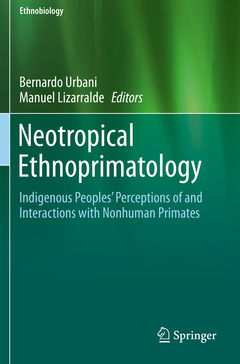Neotropical Ethnoprimatology, 1st ed. 2020 Indigenous Peoples' Perceptions of and Interactions with Nonhuman Primates Ethnobiology Series
Coordonnateurs : Urbani Bernardo, Lizarralde Manuel

Ethnoprimatology is situated at the intersection between the biological and cultural subfields of anthropology. Research on the interface between human and nonhuman primates has been steadily increasing since 1997, when the term ethnoprimatology was first coined. Although there have been studies on human?nonhuman primate interactions in the tropical Americas, no single comprehensive volume has been published that integrates this information to fully understand it in this region. Eighteen novel chapters written by outstanding scholars with various backgrounds are included in this edited volume. They refer to the complex interconnections between different indigenous peoples with New World monkeys that sympatrically share their ancestral territories. Geographically, the range covers all of the Neotropics, from southern Mexico through northern Argentina. This work includes topics such as primates as prey and food, ethnozoology/ethnoecology, cosmology, narratives about monkeys, uses of primates, monkeys as pets, and ethnoclassification. Multiple views as well as diverse theoretical and methodological approaches are found within the pages. In sum, this is a compendium of ethnoprimatological research that will be prized by anthropologists, ethnobiologists, primatologists, conservationists, and zoologists alike.
?This book? provides a historical benchmark for all subsequent research in ethnoprimatology in the Neotropics and beyond.?
? Leslie E. Sponsel, University of Hawai?i at M?noa.
TABLE OF CONTENTS
Foreword
Leslie Sponsel
Neotropical Ethnoprimatology: An Introduction
Bernardo Urbani, Manuel Lizarralde
Part I. Mesoamerica
1. Perception and Uses of Primates among Popoluca Indigenous People of Los Tuxtlas, Mexico
(Marianna Pinto-Marroquín, Juan Carlos Serio-Silva*)
2. Mental State Attribution to Nonhuman Primates and Other Animals by Rural Inhabitants of the Community of Conhuas near the Calakmul Biosphere Reserve in the Yucatan Peninsula, Mexico
(Esmeralda Urquiza-Haas*, Rosa I. Ojeda-Martínez & Kurt Kotrschal)
3. Local Knowledge and Cultural Significance of Primates (Ateles geoffroyi and Alouatta pigra) among Lacandon Maya from Chiapas, Mexico
(Yasminda García del Valle*, Felipe Ruan-Soto, Fernando Guerrero-Martínez, Felipe Reyes-Escutia)
4. Representation and Signification of Primates in Maya-Q´eqchi´ Cosmovision and Implications for their Conservation in Northwestern Guatemala
(Marleny Rosales-Meda* & María Susana Hermes)
Part II. South America
5. Ethnoprimatology of the Tikuna in the Southern Colombian Amazon
(Angela M. Maldonado* & Siân Waters)
6. Frugivorous Monkeys Feeding a Tropical Rainforest: Barí Ethnobotanical Ethnoprimatology in Venezuela
(Manuel Lizarralde)
7. Memories, Monkeys and the Mapoyo People: Rethinking Ethnoprimatology in Eco-Historical Contexts of the Middle Orinoco, Venezuela
(Bernardo Urbani)
8. Co-ecology of Jotï, Primates and Other People: A Multi-Species Ethnography in the Venezuelan Guayana
(Stanford Zent* & Egleé López-Zent)
9. Primates in the lives of the Yanomami people of Brazil and Venezuela
(Jean P. Boubli*, Bernardo Urbani, Hortensia Caballero-Arias, Glenn H. Shepard Jr. & Manuel Lizarralde)
10. Kixiri and the Origin of Day and Night: Ethnoprimatology among the Waimiri Atroari Amerindians of Central Amazonia, Brazil
(Rosélis de Souza-Mazurek* & Ana Carla Bruno)
11. Linguistic, Cultural, and Environmental Aspects of Ethnoprimatological Knowledge among the Lokono, Kari'na, and Warao of the Moruca River (Guyana)
(Konrad Rybka)
12. Relationships between Scientific Ecology and Knowledge of Primate Ecology of Wapishana Subsistence Hunters in Guyana
(Thomas Henfrey)
13. Past, Present and Future of Secoya Ethnoprimatology in the Ecuadorian Amazonia
(Stella de la Torre*, Pablo Yépez & Alfredo Payaguaje)
14. The Importance of Nonhuman Primates in Waorani Communities of the Ecuadorian Amazon
(Margaret Franzen Levin)
15. Monkeys in the Wampis (Huambisa) Life and Cosmology in the Peruvian Amazonian Rainforest
(Kacper Świerk)
16. The White Monkey and the Sloth or Pelejo Monkey: Primates in the Social and Cultural Configurations of the Shawi People of Northwestern Peru
(Luisa González-Saavedra)
17. Importance of Primates to Tacana Indigenous Subsistence Hunting in the Bolivian Amazon
(Wendy Townsend*, Robert B. Wallace, Kantuta Lara-Delgado & Guido Miranda-Chumacero)
18. When Monkeys were Humans: Narratives of the Relationship between Primates and the Toba (Qom) People of the Gran Chaco of Argentina
(Celeste Medrano* & Valentín Suárez)First comprehensive volume on the ethnoprimatology of the tropical Americas
Covers a unique, large geographical spectrum with manuscripts from Argentina, Bolivia, Brazil, Colombia, Ecuador, Guatemala, Guyana, Mexico, Peru, and Venezuela
Explores a wide range of topics from mythology and cosmology to hunting practices and primates as pets
Date de parution : 08-2021
Ouvrage de 396 p.
15.5x23.5 cm
Disponible chez l'éditeur (délai d'approvisionnement : 15 jours).
Prix indicatif 158,24 €
Ajouter au panierDate de parution : 03-2020
Ouvrage de 396 p.
15.5x23.5 cm
Disponible chez l'éditeur (délai d'approvisionnement : 15 jours).
Prix indicatif 158,24 €
Ajouter au panierThèmes de Neotropical Ethnoprimatology :
Mots-clés :
Ethnobiology; ethnozoology; ethnoecology; primatology; Latin America; Systems Biology



